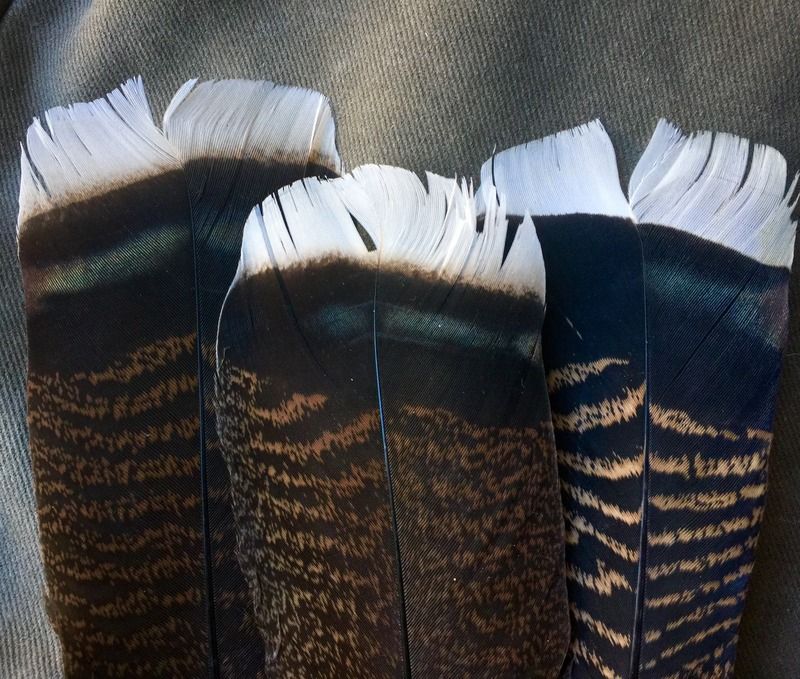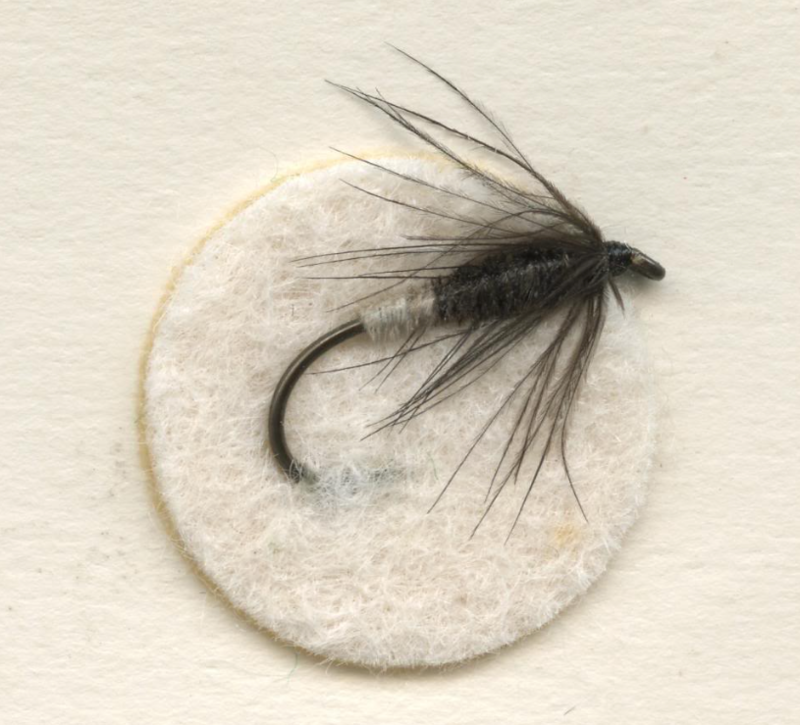Page 3 of 4
Re: Turkey tail
Posted: Fri Mar 18, 2016 2:33 pm
by redsedge
Thank you, Steve. That's a cool looking feather that I don't think we'll be seeing in the fly shops anytime soon.
Re: Turkey tail
Posted: Fri Mar 18, 2016 3:05 pm
by Roadkill
UC Steve,
Thanks for the input on the feathers!
Here is a feather I bought years ago at the NW Expo. It was with a few others simply marked Turkey Soft Hackle Feathers.


And here is today's fly for this topic and my fly boxes tied with Claret silk .

Re: Turkey tail
Posted: Fri Mar 18, 2016 3:53 pm
by daringduffer
wsbailey wrote:You can do text to speech on this site which includes Swedish:
http://www.acapela-group.com/ It obviously can't compare to an actual human voice.
Bill, the result is pretty good; she (Elin) might be stumbling on the "knekes" part but overall a good replication.
I suggest you try the SL Sedge pattern from this old thread:
http://www.flymphforum.com/viewtopic.php?f=6&t=4400 Colour in the photo is off, due to lighting used, but you already knew that.
dd
Re: Turkey tail
Posted: Sun Mar 20, 2016 10:53 pm
by Old Hat
UC Steve wrote:turkey 014 (640x506).jpg
Carl, of course it is a tail feather. By 'secondary', I mean a secondary tail feather taken from the base of the fan. When you buy turkey tail, you are usually getting tail primaries from the outer fan. The example came from a Merriam turkey that lived in the woods behind our place. There are a lot of them & roadkills are frequent. I am out of the prime feathers with no black bar, yet this example is perfectly good, & I would allow a feather showing a bit more of the dark bar. When twisted the bar shrinks to a color spot.
I'm not trying to pick on you at all Steve, but everyone keeps calling them primaries and secondaries which is very confusing. The only primary and secondary feathers on a bird are found as wing feathers not tail feathers. The big tail feathers come in two kinds, the deck feathers which are the middle two only and the undertail feathers which are down both sides and sequentially "under" the two deck feathers. The deck feathers are very desireable because of their natural symmetry. I believe the "secondaries" you refer to are the upper tail coverts and separate the tail feathers from the rump feathers. There are also under tail coverts as well which are usually quite softer.
Just a bit of FYI from the feather nazi.
Re: Turkey tail
Posted: Mon Mar 21, 2016 11:00 am
by William Anderson
Carl, I'm sure that would have been easy enough to find with a couple clicks, but I've never looked it up. Thank you very much. So, it's deck feathers and under-covert tail feathers. I've always referred to these as primary and secondary tail feathers as well. I'll try to remember this in the future and as I will invariably forget, please redirect me here, to place where I once understood. It might take a couple times.
So, fwiw, I also refer to any fibers making up the tail feathers as herls. Technically barbules, but that doesn't narrow it down much. Some call these fibers biots, whether from the wing or tail feathers, but I have been calling fibers taken from wings "biots" and those from tails "herl". Any bought a on this? Sometimes these fibers can be quite similar when isolated, depending on the species. I realize when we talk about biots we typically are referring to the "flight edge" of the primary wing feather. But then that can make naming a fly a bit wordy for me.
Thanks again for the input.
Re: Turkey tail
Posted: Mon Mar 21, 2016 11:47 am
by Old Hat
William,
The two tail feathers shown in this post are the black banded "deck or under tail feather" ( not a lot of difference between these two types other than their position and symmetry) and the un-banded upper covert tail feather.
I think for tying purposes, I would agree...biots for me have always been the flat and pointed barbs often found on the wing feathers and herl any soft strand-like barbs most often from the tail feathers. These are of course terms that are pretty specific to fly tying. The correct term for all these would be the feather "barbs". "Barbules" is the correct term for the smaller hook like appendages on the barbs that hold the "barbs" together.
I feel like I have made people defensive with my comments and I have in no way intended that tone. I hate it when this happens but it is inevitable at times in this medium. I am sorry if that was how it came across. I was just confused when people were calling it a primary or secondary feather, so I mentioned I was pretty sure it was tail feather and felt like people were basically saying "duh" we all know it is a tail feather. I believe if we are going to be so specific as to which feather is used to tie a specific pattern, like the one in this thread, than it is probably best to use the correct term to describe that feather. Of course I am one who also believes the fish don't care what feather it is. I could use two different feathers to get the same effect from the fish's perspective. This of course is getting way off topic so I will cease and desist so as to get back to this wonderful thread.
Re: Turkey tail
Posted: Mon Mar 21, 2016 12:29 pm
by William Anderson
Carl, without emoticons or paragraphs to capture tone, I'll just say I very much appreciate your effort to keeps us communicating accurately toward a common end. Much thanks.
Friday I bought a couple symmetrical turkey deck feathers that are well barred and have a tan-ivory tips. These were expensive (Orvis shop) but I wanted to photograph them for this purpose. Then I visited the brand new TCO shop in Boiling Springs PA and they carried a pair of deck feathers (1/3 the cost) similar to the feather I had when I tied this fly some time ago with bright white tips and deep brown black section below that. It's something to photograph and Have someone who knows something about these to comment. Unfortunately I'm in mid travel to Hilton Head with the Fam for some beach time. Pics will have to wait.
By all rights, it's a compelling pattern and unlike the thought that a dark pattern creates heightened visibility in some conditions and a hot spot offers the trout a strike point. I don't have a strong opinion on that part of the story, but it is always fascinating to hear the extended thoughts of pattern designers. I we stand on the shoulders of those that come before, it's fun to hear what they had in mind.
Love this stuff. And Stefan, thanks so much for liking back to the original thread on this fly.
Re: Turkey tail
Posted: Wed Mar 23, 2016 5:26 pm
by UC Steve
Roadkill, I like the looks of your version. Like the hackle.
Carl, no need to apologize, far as I'm concerned. I'm a feather nazi too. That's why I chimed in about the Knekestorparen. Thanks for expanding my glossary of terms. Now I will use them & few will know what i'm talking about when I refer to a 'deck' feather, but that's cool, I enjoy being ambiguous while correct.

William, for a long time, I've referred to tail barbules/fibers as 'swords', for no particular reason except to parrot what respected tiers I've read call them & I think it an aptly descriptive term. And there does seem to be some difference between popular fly-tying terms & scientific terms...
Regardless, discussion will inform your writing. And that is good.
Re: Turkey tail
Posted: Thu Apr 07, 2016 10:59 am
by wsbailey
This shop might be able to provide the correct feather if shown a picture in an email. I was able to get some at any rate.
http://wildgamechanger.com/t/wild-turkey-feathers
Tom, thanks for trying out my wax. I hope you like it.
Bill
Re: Turkey tail
Posted: Fri Apr 08, 2016 8:41 am
by William Anderson
This is the feather I used when tying the Knekestorparen pattern to match the Gunnar Johnson fly shown in his stamp. Later when Lance posted the pattern tied by Gunnar and given to Pete Hidy I tried a few with longer sections of both the white and the black areas of the body. It's just a very cool pattern.

It took some looking to get these feathers with enough white and black in the tops of the deck feathers. Now that I found them they'll probably fall from the sky, but I'm glad to have them for this pattern.

Photo by Lance Hidy from a previous thread on the topic of the Knekestorparen fly by Gunnar Johnson

